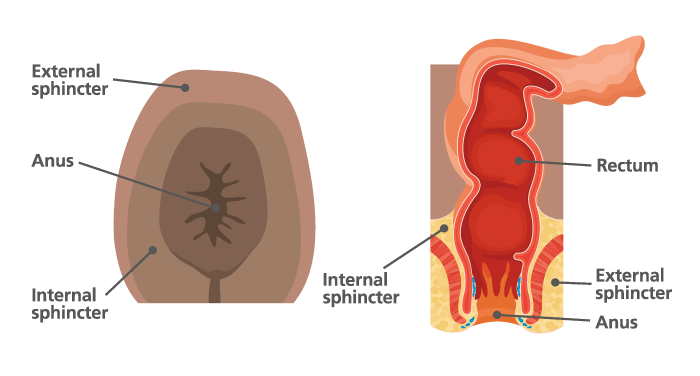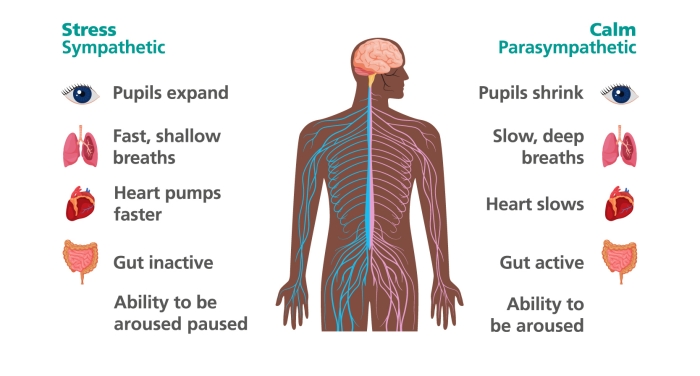The anus is highly sensitive and rich in nerve endings. When you are aroused, chemical messages and hormones are sent around your body which allow physical changes to take place such as:
- your heart rate and blood pressure increase
- blood flows to your genitals
- your muscles tense
- your heart beats faster
- your breathing becomes faster and deeper
The anus becomes more sensitive to touch and the rectum expands. However, unlike the vagina, the rectum doesn’t produce any natural lubrication.
These physical changes prepare your body for sexual contact, and can make touch feel comfortable and enjoyable. It is important that you give your body time to respond during the arousal process, so that you don’t feel any discomfort during a sexual experience. It is also important that you feel confident talking about this with your sexual partners so they understand and can respond to your feedback about how turned on you feel.
If anything gets in the way of the arousal process, then these physical changes may not happen and your body won't be prepared for sex.
There are two sphincters (rings of muscle) just inside the anus, which are shown in the diagrams below. The external one is a voluntary muscle, which you can flex as you squeeze your pelvic floor muscles (more on this later). The internal sphincter is an involuntary muscle that will clamp shut in an automatic response if you try to insert anything into it. This can lead to unpleasant, painful or disappointing experiences of anal play/penetration. However, as with other reflex muscles, you can train it to relax (as you do when learning not to blink while inserting contact lenses, for example).

Most people with penises will have a prostate gland located in front of the rectum Anal penetration stimulates this gland, which can produce intensely pleasurable sensations resulting in orgasm. In people with vaginas, anal penetration can provide indirect stimulation of the vagina wall. Some people find areas of this to be highly sensitive and some find stimulating it to be very pleasurable.
The impact of anxiety on arousal
The arousal process is controlled by a part of the nervous system called the parasympathetic nervous system (PNS), which is an involuntary, or automatic, system that is active when our mind and body is in ‘calm’ mode.
There is another system in the body, called the sympathetic nervous system (SNS), which works in opposition to the PNS - when one is in control, the other closes down. The SNS controls the brain and body when we feel stressed, anxious, or in danger (in ‘stress’ mode). This is sometimes called the ‘fight or flight response’.
When the flight or fight response is activated, it sends blood to the muscles we need to run or fight (for example, our arms and legs) and shuts down all non-essential functions that we wouldn’t need if we were in danger, including the arousal system.
The diagram below demonstrates the impact these two systems have on the body:

The fight or flight response can kick in for both real or perceived/imagined threats, meaning that worrying about something is enough to trigger these physical changes in our bodies. As shown in the diagrams, the body has to be relaxed (or in ‘calm’ mode) in order to become sexually aroused. When you’re anxious or worried (whether about being in a sexual situation or about anything else), your body switches into ‘stress’ mode which pauses the arousal system.
The image is a medical diagram - the impact of the ‘Stress’ or Sympathetic Nervous System and the ‘Calm’ or Parasympathetic Nervous System on the body.
The labels for the 'Stress' system include:
- pupils expand
- fast, shallow breaths
- heart pumps faster
- gut inactive
- and ability to be aroused is paused
The labels for the 'Calm' system include:
- pupils shrink
- slow, deep breaths
- heart slows
- gut active
- and ability to be aroused
Anal penetration and pain
Feeling any sort of pain during anal play and/or penetration can have a negative effect on your enjoyment. Sex ought to be an enjoyable and happy experience for all partners, and if you are experiencing pain, or are anxious about the possibility of feeling pain, you are probably not going to be able to relax and enjoy yourself. Discomfort on anal penetration, though fairly common, is not something you should endure.
As we have learned, being sexually aroused is a necessary part of enjoying anal play. However, if we are worried or anxious about something, the body’s sexual arousal response can’t work properly. It may be interrupted or it may not happen at all.
This will mean that the physical changes that make sexual touch and penetration comfortable won’t take place, and penetration is likely to be uncomfortable or painful as a result. Not only that, but feeling pain on one occasion can lead you to expect pain the next time you have sex. Anticipating pain in this way can further interrupt your body’s sexual arousal response, cause tension in your pelvic muscles and make pain more likely.
It is important to have a medical assessment by an appropriately trained medical professional, such as a specialist in sexual problems, to ascertain the role of any physical or medical factors contributing to difficulties you are having with painful anal penetration. Your GP may be able to help with this, or signpost you to an appropriate service.